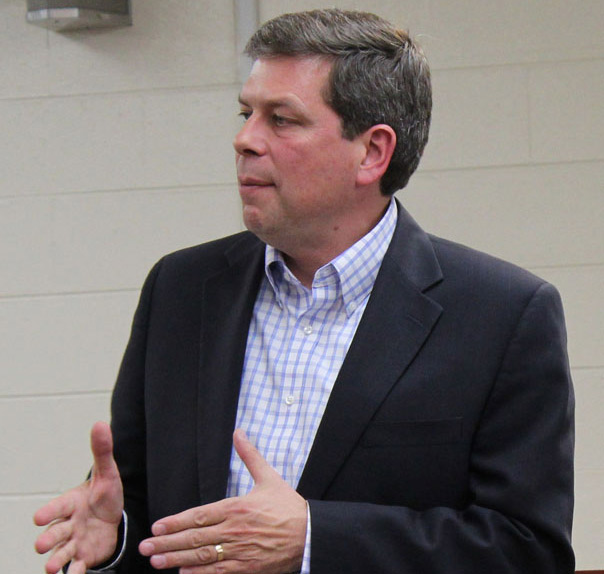Nearing the end of what he called a “very, very close campaign,” Sen. Mark Begich, D-Alaska, made a swing through Homer on Sunday, asking for support and answering questions from a crowd of about 75 people at the Homer Middle School library.
In her introduction, Homer resident Liz Downing described Begich as “a lifelong Alaskan” who has “risen through the ranks.” Along with Alaska Sen. Lisa Murkowski, a Republican, Begich serves on the U.S. Senate Committee on Appropriations.
“One important thing about the Appropriations Committee, there cannot be two Republicans on it and Lisa Murkowski is on there, so do the math,” said Downing, referring to representation on a committee by two senators from the same state.
Begich also serves on the U.S. Senate Committee on Commerce, Science and Transportation; the Committee on Homeland Security and Governmental Affairs; is chairman of the Subcommittee on Emergency Management, Intergovernmental Relations and the District of Columbia; the Senate Committee on Indian Affairs; is chairman of the Commerce Subcommittee on Oceans, Atmosphere, Fisheries and Coast Guard; and is on the Committee on Veterans’ Affairs.
“He is a problem-solver,” said Downing.
Begich is the son of Pegge and the late Nick Begich, Alaska’s third U.S. congressman, who disappeared on a flight between Anchorage and Juneau in 1972. He was elected to the Anchorage Assembly in 1988 and and served as mayor of Anchorage before being elected to the U.S. Senate in 2008.
Begich credited the energy of the current campaign to the widespread support of Alaskans like former First Lady Bella Hammond and former CIRI CEO and President Margie Brown. He also credited a campaign strategy that includes offices throughout the state and making personal visits.
“We have knocked on every single door in rural Alaska because every single one of those votes count and we’re trying to earn them,” said Begich. “The way I win is with people. I always have won this way. People are coming out, stepping up, pounding the pavement, doing the things that make a difference.”
The number of donations was another way Begich measured the support he has received.
“We have well over 5,500 Alaskans that have donated to our campaign,” said Begich. “What does Sullivan have? Four hundred. Is that amazing?”
Noting those 400 were “very wealthy,” Begich went on to say, “I love that we have that kind of volume. Those are voters. Those are people that care. … Where we’re going to win this race is like this. On the ground.”
Asked for his strategy to deal with the amount of outsourcing of jobs and manufacturing in the country, Begich said companies are shipping overseas because they believe it’s a cheaper and better way to do business.
“What we have done by our tax structure is actually incentivize companies to go overseas,” said Begich, who is working on legislation to eliminate loopholes in the tax code. Speaking in favor of tax reform from a broader perspective, he supported offering incentives that support small, local businesses.
On the subject of education, Begich said, “No Child Left Behind was the biggest mistake we could have made. … The way it was done was one size fits all and then make sure your kids pass the tests.”
He spoke in favor of decisions regarding education being made at the local level, using the financial boost given to Head Start and Title I schools last year as examples.
“That wasn’t enough, but it was a move in the right direction, We know the money will be used on the local end for local needs, rather than a plan from Washington,” he said, adding, “Education is the greatest equalizer in this country. What you do with it is up to you.”
Also on the subject of education, he said he is working on bills to knock down the interest rates on student loans and the refinancing of student loans.
Responding to a question referring to the U.S. Supreme Court ruling that recognizes corporations as individuals and their right to make political donations Begich, who is working on a constitutional amendment to reverse that decision, said “They will be people the day they walk into a courthouse or a church and get married.”
When questioned about the environment, Begich pointed to the rehabilitation of Ship Creek, Fish Creek and Campbell Creek while he was mayor of Anchorage.
He also talked about his stand on Pebble mine. While he is not opposed to mining, Begich was clear Pebble is “the wrong mine in the wrong place.”
Recalling the 1971 “Crying Indian” ad that featured a Native American man crying at the condition of the environment, Begich said, “There’s a lot of things we should be doing more of. I think our job from the budget end is to make sure the resources are there and also be doing what we can, protecting areas for the long term.”
Wrapping up the town hall-type meeting, Begich encouraged his audience to take advantage of early voting, which begins Oct. 20.
“Vote early. Get it off the agenda and then help other people vote,” he said.
With 100 seats in the U.S. Senate — 53 held by Democrats, 45 by Republicans and two by independents — there are 36 seats at stake in November’s midterm elections. Of those 36, 21 are held by Democrats and 15 by Republicans. Six additional seats would shift control of the Senate to the Republican Party.
The outcome of an Alaska race has never been so critical in deciding what party controls the U.S. Senate, according to Begich.
“Is that amazing?” he said. “Think about it.”
McKibben Jackinsky can be reached at mckibben.jackinsky@homernews.com.



